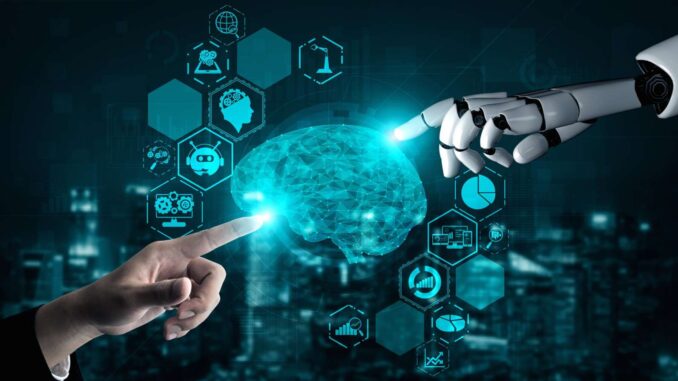
The integration of artificial intelligence represents a transformative shift in how organizations operate, make decisions, and interact with customers and stakeholders.
This multifaceted integration has far-reaching implications across various industries and societal domains. Here are some key dimensions of what this integration signifies:








### 1. **Innovation and Competitive Advantage**
– **New Business Models**: AI integration is enabling businesses to innovate new products and services, disrupting traditional business models. Companies can create unique user experiences and improve service delivery, giving them a competitive edge.
– **Faster Time to Market**: With AI tools automating processes and improving efficiency, organizations can accelerate their development cycles, bringing solutions to market quicker than ever before.
### 2. **Enhanced Decision-Making**
– **Data-Driven Insights**: AI enables organizations to process and analyze vast amounts of data in real-time, uncovering insights that would be difficult for humans to identify. This leads to informed decision-making based on predictive analytics and trend identification.
– **Risk Mitigation**: By forecasting potential risks and generating scenario analyses, AI helps organizations make proactive decisions that can mitigate risks associated with market volatility, supply chain disruptions, and other uncertainties.
### 3. **Improved Efficiency and Productivity**
– **Automation of Routine Tasks**: The integration of AI automates repetitive and mundane tasks, freeing up human resources to focus on higher-value activities that require creativity and critical thinking.
– **Operational Optimization**: AI can analyze workflows and processes to identify inefficiencies, leading to optimized operations and reduced costs across sectors such as manufacturing, logistics, and healthcare.
### 4. **Personalization and Customer Engagement**
– **Tailored Experiences**: AI allows organizations to offer personalized experiences based on detailed customer behavior analysis. This includes recommendations in e-commerce, customized marketing messages, and tailored product offerings that enhance customer satisfaction and loyalty.
– **Enhanced Customer Support**: AI-powered chatbots and virtual assistants provide immediate, round-the-clock support, enhancing customer service capabilities and reducing response times.
### 5. **Scalability and Flexibility**
– **Scalable Solutions**: AI systems can easily scale to handle increased demand, whether through cloud-based solutions or on-premises systems. This scalability allows organizations to grow without the corresponding increase in operational overhead.
– **Adaptability**: AI systems can adapt to changing circumstances by learning from new data and shifting patterns in consumer behavior, allowing organizations to remain agile in dynamic environments.
### 6. **Ethical and Responsible Use of Technology**
– **Addressing Ethical Concerns**: The integration of AI also raises critical ethical issues, including bias, fairness, privacy, and accountability in decision-making processes. This prompts organizations to develop ethical frameworks and guidelines for responsible AI use.
– **Transparency and Trust**: With growing public concerns regarding AI systems, organizations are increasingly focusing on transparency in AI operations and building trust with consumers by making AI-driven decisions more interpretable.
### 7. **Collaboration Between Humans and Machines**
– **Human-AI Partnership**: The integration of AI emphasizes a collaborative approach where AI complements human skills rather than replacing them. This collaboration can lead to enhanced creativity and problem-solving capabilities.
– **Changing Workforce Dynamics**: As organizations integrate AI, the workforce will need to adapt, requiring new skills and training to work alongside intelligent systems effectively.
### 8. **Addressing Global Challenges**
– **Sustainability**: AI offers promising solutions to pressing global challenges, including environmental sustainability, climate change mitigation, and resource optimization.
– **Healthcare Advancements**: In healthcare, AI enhances diagnostics, patient care, and personalized medicine, significantly improving outcomes and operational efficiencies.
### Conclusion
In summary, the integration of artificial intelligence signifies a paradigm shift in the operational landscape of businesses and organizations. It is an enabler of innovation, efficiency, and strategic foresight, providing the tools necessary to navigate the complexities of a rapidly changing world. However, it also brings challenges that must be addressed, particularly regarding ethics, skills development, and the responsible use of technology. As organizations continue to embrace AI, the landscape of work, industry, and society will evolve profoundly, shaping the future in ways that are both exciting and demanding.

Leave a Reply